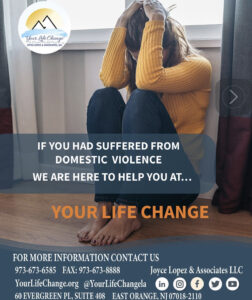Domestic Violence
- On average, nearly 20 people per minute are physically abused by an intimate partner in the United States. During one year, this equates to more than 10 million women and men.
- 1 in 4 women and 1 in 9 men experience severe intimate partner physical violence, intimate partner contact sexual violence, and/or intimate partner stalking with impacts such as injury, fearfulness, post-traumatic stress disorder, use of victim services, contraction of sexually transmitted diseases,
- 1 in 3 female murder victims and 1 in 20 male murder victims are killed by intimate partners.
- Victims of intimate partner violence lose a total of 8,000,000 million days of paid work each year, the equivalent of 32,000 full-time jobs.
- Intimate partner violence is estimated to cost the US economy between $5.8 billion and $12.6 billion
What Is Domestic Violence?
Domestic violence can be physical or psychological, and it can affect anyone of any age, gender, race, or sexual orientation. It may include behaviors meant to scare, physically harm, or control a partner. And while every relationship is different, domestic violence typically involves an unequal power dynamic in which one partner tries to assert control over the other in a variety of ways.
Insults, threats, emotional abuse, and sexual coercion all constitute domestic violence. Some perpetrators may even use children, pets, or other family members as emotional leverage to get their victims to do what they want. Victims of domestic violence experience diminished self-worth, anxiety, depression, and a general sense of helplessness that can take time and often professional help to overcome.
A clinician who works with victims of domestic violence may be able to help an individual extract her or himself from the situation, as well as offering psychological support.
How Abuse Impacts Victims
It can take time before victims of domestic violence recognize their situation for what it is. Abuse often leaves physical marks, from bruises and broken bones to shortness of breath and involuntary shaking. Seeming more prone to “accidents” than the average person can be a warning sign that someone is being abused. Abuse victims can also suffer both short and long-term emotional and psychological effects, including feelings of confusion or hopelessness, depression, anxiety, panic attacks, and post-traumatic stress disorder (PTSD).
How Do You Identify an Abusive Partner?
Abusers aren’t easy to spot. They hide in plain sight, often exhibiting Jekyll-and-Hyde behavior. In public, they seem smart, trustworthy, and charming with a personality that draws people in, but in private, they are a waking nightmare. Many abusers learn violence from their family of origin and repeat the toxic patterns with their own partner and/or children. They are also more likely to have trouble with the law as well as substance abuse problems.
Abusers often isolate their victims from family, friends, work, and any other outside sources of support. They may have explosive tempers and may become violent during an abusive episode; afterward, they become remorseful and try to woo their partner back with charm and affection and promises to change, but the abusive behavior rarely stops.
Heterosexual male abusers often believe in traditional gender roles, particularly that women’s main priority should be to care for their partner and children. They have to be in control and are especially prone to jealousy, accusing their partner of cheating without any reason and needing to know where their partner is at all times.

Social issues, domestic violence with young husband trying to reconcile with abused wife
To determine whether your relationship is abusive, answering YES to the questions below, the more likely it is that you’re in an abusive relationship.
Do you:
- feel afraid of your partner much of the time?
- avoid certain topics out of fear of angering your partner?
- feel that you can’t do anything right for your partner?
- believe that you deserve to be hurt or mistreated?
- wonder if you’re the one who is crazy?
- feel emotionally numb or helpless?
Your partner’s belittling behavior.
Does your partner:
humiliate or yell at you?
criticize you and put you down?
treat you so badly that you’re embarrassed for your friends or family to see?
ignore or put down your opinions or accomplishments?
blame you for their own abusive behavior?
see you as property or a sex object, rather than as a person?
Your partner’s violent behavior or threats
Does your partner:
have a bad and unpredictable temper?
hurt you, or threaten to hurt or kill you?
threaten to take your children away or harm them?
threaten to commit suicide if you leave?
force you to have sex?
destroy your belongings?
Your partner’s controlling behavior
Does your partner:
act excessively jealous and possessive?
control where you go or what you do?
keep you from seeing your friends or family?
limit your access to money, the phone, or the car?
constantly check up on you?
Speak up if you suspect domestic violence or abuse
If you suspect that someone you know is being abused, speak up! If you’re hesitating—telling yourself that it’s none of your business, you might be wrong, or that the person might not want to talk about it—keep in mind that expressing your concern will let the person know that you care and may even save their life.
Talk to the person in private and let them know that you’re concerned. Point out the signs you’ve noticed that worry you. Tell the person that you’re there for them, whenever they feel ready to talk. Reassure them that you’ll keep whatever is said between the two of you, and let them know that you’ll help in any way you can.
Remember, abusers, are very good at controlling and manipulating their victims. People who have been emotionally or physically abused are often depressed, drained, scared, ashamed, and confused. They need help getting out of the situation, yet their partner has often isolated them from their family and friends. By picking up on the warning signs and offering support, you can help them escape an abusive situation and begin healing.
If you are a Victim of Domestic Violence, here at Your Life Change Center we have the necessary tools to help you and resolve it. Just Call us!

#Domesticviolence
#ConflictResolution #FamilyTherapy #PsychoTherapy
#Depression #Anxiety #PTSD #Addiction #obesity #DepressionAwareness #MentalHealth #EastOrangeNJ #NewarkNJ #EssexCountyNJ #SettonHallUniv #EssexCountyCollege #WestOrangeNJ #OrangeNJ #invirgtonNNJ #PatersonNJ #PassaicNJ #PassaicCountyNJ #MontclairNJ
For more information visit:
Or watch a video on Domestic violence at:




